Text
Summer Sport Poetry Competition: Winners Announced!
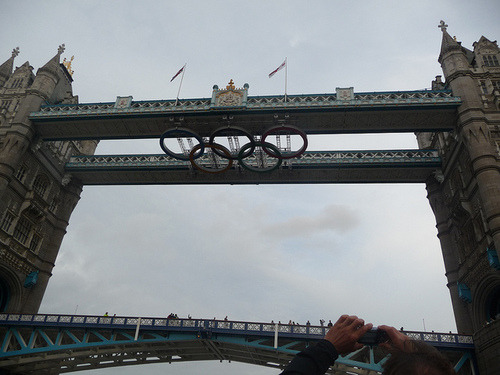
Thank you to everyone who submitted to the Summer Sport Poetry Competition. As in elite athletics, the many talented competitors made judging challenging. How many points for technical merit vs. artistic impression? How to inch one poem in front of another without the aid of a photo finish? Thank you for the array of sports to choose from, including poems on synchronized swimming, football, golf, tennis, rowing, running, racewalking, baseball, basketball, fencing, ultimate frisbee, and more.
In the end, I decided on an array of approaches to the subject of sport:an enthusiastic fan, a reflective competitor, a novel view of sports equipment, and a found poem.
There is certainly enough material here to warrant further sports poetry competitions, perhaps a special issue of a magazine or literary journal devoted to sports poetry or even an anthology. Congratulations to the winners. - Priscila Uppal
Below are the four winners of the 2012 Summer Sport Poetry Competition. All four will be receiving prize packs, and the poem that took gold will appear in the upcoming November 2012 print issue of the LRC.
GOLD (Grand Prize Winner): "Summer Sport" by Heather Davidson
It’s you, weightlifter, who could bring me
Persian gold when you win and this is
the only good anyone knows. A static
acrobat, an iron tiger, a juggler in pose.
Anvils and axles greased with sweat,
a face more set in scowl than skin.
The barbell for your body and half of
someone else’s, yours again. Weight is
what you train past, a grip like crushing
eggs and balance through the thighs.
Clean and jerk, glass holds back the world.
I want another trick, what else can you do.
Crouch and animals run through
the deltoid, the triceps. Bounce the bar
off your chest, hold it up and you live,
there is nothing they can do.
SILVER: A haiku by kjmunro
golden maple leaves
bounce
on the backyard trampoline
BRONZE: "Towards a Definition of Sport" by David Huebert and "No Man's Land" by Josie Di Sciascio-Andrews
"Towards a Definition of Sport"
words overheard in Canadian pubs and locker rooms
Soccer is not a sport.
It’s just a bunch of long-haired pretty boys
with bright shoes and fancy socks,
diving every time they get touched.
If there’s no body contact it’s not a sport.
Rugby’s not a sport, it’s a bunch of
ogres rolling around in the mud.
Football is basically just a version of war.
I think the guy who won the gold
in dressage is like ninety years old.
Baseball is not a sport, it’s a pastime.
Golf’s not a sport, it’s a leisure activity.
I think they should rename boxing
facepunching and see how many kids sign up.
We’re watching beach volleyball,
or as I like to call it, “tits and ass.”
Table tennis, seriously?
Synchronized swimming, really?
When did they take bowling out of the Olympics?
Maybe there should be more guns
so the Americans could get even more medals.
We should probably have hockey in the summer too.
"No Man's Land"
There is a certain comfort in the symmetry
Of striking pressurized air
Of optic yellow felt
As it is precisely loosed
From the left hand’s grip,
While with well thought out,
Taut-weaved racket precision,
A backhanded right one smashes it across the court
A world over the net at center
Stretching its’ equator to the tentative,
Invisible dragons lurking in the sidelines.
Adrenaline primes you into that zone
Of brain-body synchrony
Where you anticipate all angles
Of your opponent's rebuttals.
Simultaneously you shadow
Her moves as you rally, lunge
Your weight diagonally through air
Onto the gravity of rubberized concrete
To block all coups
Re-entering the dharma
Of a frantic little Dutch boy,
Should any hint of loss overtake
You. Your country.
One fault, like one drop of ocean
Beginning to stream through some tiny crack
In the solid wall of your well rehearsed,
Calculated resistance.
#priscila uppal#summer sport poetry competition#summer sport poetry competition winners#contest#poetry contest#canadian poetry contest#contest winners#winning poems#summer sports#olympics 2012#olympic games#paralympics 2012#london 2012
0 notes
Text
Poem: An Athlete Epitaph
Born in Canada—
DNF.
#priscila uppal#London 2012#London 2012 Paralympic Games#london paralympics#london 2012 olympic games#paralympics#paralympic games#paralympics 2012#paralympic games 2012#paralympics poem#poem#poetry#epitaph#athlete#sports#sports poem
0 notes
Text
Sports Tourism and Farewell
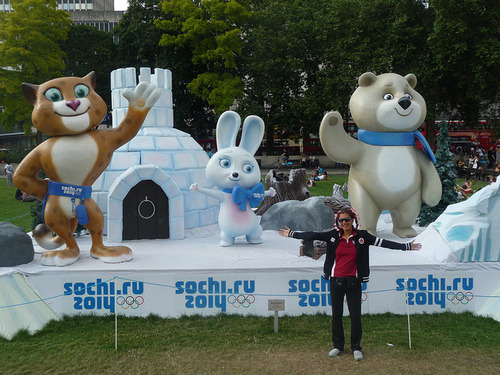
Above: Priscila Uppal. "See you in 2014 in Sochi, Russia! (You never know...)"
Flame extinguished, the 2012 London Olympics and Paralympics are now officially over. As is the summer and the generating portion of my Summer Sport Poems project. But for those of you, like me, who are feeling a little blue at the prospect of waiting two more years for winter Olympic and Paralympic action from Sochi, Russia, and are nervously biting nails over the NHL negotiations (we diehard Toronto Maple Leafs fans never learn), I would like to draw your attention to a wonderful resource that can not only expand your knowledge and range of options in our existing global sports circuit, but can also help you plan your travel calendar.
The book is A Year of Sports Travel published by Lonely Planet and it is organized by month and week to enable you to either look up what sports events are on during your vacation time or to help you plan when you might want to take time off. While the book includes all the biggies such as the World Cup, the PGA Masters, and Wimbledon, as well as the World Championships, for the majority of the Olympic sports such as race walking or beach volleyball or figure skating or curling, the delight of the book rests in discovering activities you’ve never even heard of before. Take for instance camel wrestling in Turkey or yukigassen, Japan’s national snowball fighting competitions, or the Kabaddi World Championships (the only combat sport to integrate yoga) or extreme unicycling, or Italy’s Battaglia Delle Arange (Battle of the Oranges), a massive food fight involving 400,000 kg of oranges. Or how about attending the Nude Olympics in Australia, where the most common injury is sunburn, or World Championship Chess Boxing, where four-minute sessions of speed chess are followed by three-minute bouts of boxing.
While the majority of these events are open only to the elite athlete or professional, a few are open to contestants willing to travel and pay the requisite participation fees. And the sport that has truly captured my imagination is culinary as well as aerobic-based: Cheese Rolling. Where? Cooper’s Hiss, Brockworth, England. When? Last Monday in May. What? Competitors chase a handmade 7lb circle of Double Gloucestershire cheese down the hill, rolling, sliding, tumbling to be either the first to the bottom or the first to grab the cheese. The Prize? You get to keep the cheese. Dangers? Thirty-three people were injured in 1997 so police cancelled the event the following year, but you can’t keep good cheese down and the event was revived. Why? Perhaps it’s because I once studied 19th century Canadian poet James McIntyre, who wrote numerous odes to cheese becoming informally known as the ‘Chaucer of Cheese’ (I’m not joking), but I giggle out loud every time I turn to this page of the book. Oh yes, let’s chase the cheese, I hear a voice say in my head. Why not? And my husband grows slightly nervous as to what our next adventure will be.
I guarantee if you take a look through this book you’ll find something that will lead you to Google your favourite travel planning websites. It’s one way of ordering the year and the future, and might make the difference between Australia this year or Norway the next.
Farewell
Some athletes claim to suffer from Post-Olympic Stress Disorder. I think I might end up suffering from Post-Poet’s Corner Stress Disorder. It’s been an exhilarating, but exhausting run. I must maintain my momentum to review and edit these poems for their eventual publication as the book Summer Sport: Poems with Mansfield Press (winter/spring 2013).
Here are the stats:
Canada Olympic Medal Count: 18 Medals: 1 Gold, 5 Silver, 12 Bronze
Canada Paralympic Medal Count: 30 Medals : 7 Gold, 14 Silver, 9 Bronze
Priscila Uppal Poem Count: 70 poems (published primarily here at the Literary Review of Canada and the Canadian Athletes Now website, but also in The Toronto Star and on CBC, truck and PBS National News and RCI websites)
Priscila Uppal Blog Posts Count: 16
[And in between the Olympic and Paralympic Games, I returned to Toronto to race in the Women’s Run in Sunnybrook Park and smashed my personal best time of 23:10 with a 22:29 finish, earning me a first place plaque for my age group and a 10th place overall finish in the race!]
I would like now to extend my utmost gratitude to all the organizations and individuals who have made this project possible, including Access Copyright, The Ontario Arts Council, The Social Sciences and Humanities Research Council, and The Faculty of Liberal Arts and Professional Studies at York University. A huge thank you to everyone at the Literary Review of Canada and Canadian Athletes Now. And of course to all my fellow sports and arts fans and the various travellers I’ve met along the way.
If you’ve enjoyed the poems and posts or watching the Olympics and Paralympics, please consider making a donation to the Canadian Athletes Now Fund or to the Literary Review of Canada. Or even my purchasing a copy of Winter Sport: Poems or pre-ordering Summer Sport: Poems (I donate my royalties from these books to Canadian Athletes Now Fund).
Perhaps I’ll see you next May at Cooper’s Hill, Brockworth, England?
Wishing you physical and creative health,
Priscila Uppal
***
Check out our London 2012 Olympics Poetry round-up, featuring links to 38 of Priscila's Olympics-inspired poetry from the London 2012 Games around the web.
Stay tuned for our announcement of the Summer Sports Poetry Competition winners on September 24!
#priscila uppal#olympics#paralympics#olympic games#paralympic games#sochi#sochi olympics#nhl negotiations#nhl#hockey#summer sport poems#sports poems#sports poetry#london 2012#maple leafs#sports travel#travel#review#book review#a year of sports travel#lonely planet#camel wrestling#yukigassen#kabaddi#extreme unicycling#nude olympics#chess#boxing#cheese rolling#literary review of canada
0 notes
Text
Poem: Afterwards
After the canoes and kayaks have been lifted out
of the water, the painted lines on fields and courts erased,
the nets lowered, the bicycles sent for tune-ups, the scoreboards
reprogrammed, the trunks and singlets tossed in the wash,
sneakers unlaced, pools drained, gloves hung, mats soaked
in vinegar, the show jumps dismantled, ticket stubs
recycled, the starting blocks stored, hurdles stacked,
concession stands closed down.
After the flags have been reverently folded
and all the medals and tears distributed.
You pack up your kits and board your planes and trains,
returning to your home countries for brief respites and parades,
icing your sprains and other sore spots, managing your families
and egos, and stroking memories of when you exposed
yourself to the whims of history.
We wash our faces, and turn off our televisions,
stop frantically checking our devices for good news,
and go back to our own daily grinds,
our private successes and failures,
with heavy hearts and heavier dreams
which award us few medals and fewer fans,
our unknown journeys but known eventual destination
diligently training for our own fearfully perfect dismounts.
***
For more Paralympics-inspired poetry by Priscila Uppal, check out "Three Fates" and "World Record Jukebox."
#sports#sports poetry#sports poem#disability#disability poem#poetry#poem#paralympics#paralympics poem#paralympics 2012#paralympic games#paralympic games 2012#london 2012#london paralympics#london 2012 paralympic games#london 2012 paralympics#priscila uppal#canoe#kayak#bicycle
2 notes
·
View notes
Text
Poem: Rules of the Republic of Paralympic
At customs officials welcome passports by cheers.
Everyone you encounter is immediately identified numerically
according to level of ability.
Roads are sectioned into individual lanes.
Paperwork is filed by relay.
Pain: an unlimited resource used for fuel.
Engineers and architects work round the block
on cutting-edge renovations.
Medical reports are written in invisible ink. After applying
lemon juice and tears, an image of your future self appears.
One ought never be caught being a couch potato.
In the event of a false-start, the guilty party is called back
to the line for a second chance.
All lovers are mandated to remain within 50 centimetres
of each other at all times.
***
Interested in more Paralympics-themed poetry? Check out "Ode to Kiss Cams" or "Party Games."
#priscila uppal#paralympics#paralympic games#paralympics 2012#paralympic games 2012#london 2012#london 2012 paralympics#london 2012 paralympic games#poem#poetry#paralympics poem#disability#customs#passports
0 notes
Text
Portraits of the Games
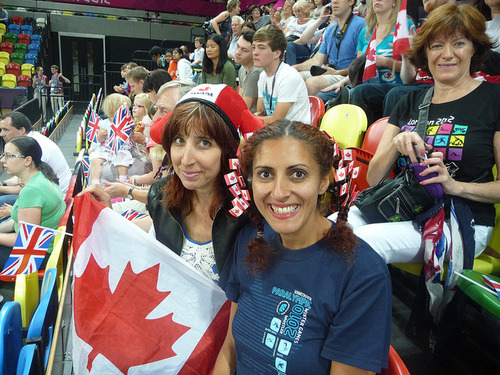
Above: Priscila Uppal (with her now famous patriotic red hair decorated with several Canadian flags) with friend Tracy Carbert (who had never before attended a live sporting event) at the Copper Box in Olympic Park to watch Goalball.
While I have mostly been keeping strictly to the Olympic and Paralympic time schedules, I have ventured away from Olympic Park, the ExCel Centre, and the Lord’s Cricket Grounds on occasion to take in some of the city’s theatre and art. I was lucky to catch the end of a second sold-out run of London Road, a unique and moving musical about the effects of a serial killer on the town of Ipswich, where many of the lines from the songs were taken from actual transcripts and interviews with residents. The next night, I cringed and laughed at Abigail’s Party, by the playwright and filmmaker Mike Leigh, to my mind a comedic version of Who’s Afraid of Virginia Woolf?
I was also able to squeeze in two trips to the Tate Modern, my favourite museum in London, to see the showcase of Britain’s most famous living visual artist, Damien Hirst (the exhibition was filled with baffled adult tourists and amused children strolling about live butterflies birthing from cocoons, sliced cows and calves, a gigantic shark, and pills, pills, pills galore), as well as another special exhibition devoted to Edvard Munch, which highlighted successfully the influence of photography and early films on his painterly techniques.
But no trip to London would be fully complete to me if it did not include a visit to London’s National Portrait Gallery. As an English Literature scholar, each room is an experience of déjà vu, of pinpointing which portraits are featured on which book covers of half our home library, from the stately portraits of Tudors to the history paintings to the self-portraits. I usually spend a good fifteen minutes alone with the portraits of Sir Philip Sidney and John Donne as if I were gazing at yearbook photos of old loves.
As a special exhibit, the National Portrait Gallery features “Road to 2012,” a three-year project with photographers Anderson and Low, Jillian Edelstein, Brian Griffin, Emma Hardy, Nadav Kander, Finlay MacKay, Katherine Green, and Bettini von Zwehl; more than 100 commissioned portraits to celebrate the British involved in the Games, the largest photographic commission the National Portrait Gallery has ever undertaken.
The results are varied, both in style of portrait and success. Kander’s black-and-white photographs of some of the country’s youngest athletes are striking in their pensive, dramatic quality, giving the youth a berth and density usually saved for the more experienced subject. A second sequence by Kandar features life-sized cut-outs of a selection of Torch Bearers from the 8,000 nominated from across the U.K. Many were selected due to either their struggles with illness or other forms of adversity as well as for volunteer work in the community. One stand-out is Diana Gould, 100 years old, who was applauded for running exercise classes in the retirement flats where she lives.
“People only want to look at photographs of famous people,” my photographer friend frequently laments when strolling through art galleries. And this is usually true. Therefore, the exhibition features many of Britain’s Olympic and Paralympic hopefuls, such as diver Tom Daley, heptathlete Jessica Ennis, and wheelchair racer David Weir, as well as the Mayor of London and Her Royal Highness Kate Duchess of Cambridge. However, when faced with unfamiliar faces, it is some of the details on the placards, like those offered in the Torch Bearer series, which draw the viewer to take a second or even third glance at the stranger at the centre of the frame.
Two notable instances are courtesy of Jillian Edelstein, who photographed many of the people responsible for the complex logistics of the world’s largest sporting event. Reading the placard for the portrait of Jan Matthews, Head of Catering, one learns that she is responsible for the staggering number of 14 million meals for over 77 days (the World Cup has 750 athletes, the Olympics and Paralympics 17,500). We are also introduced to Robert Hillier, the man responsible for supplying over 4,000 semi-mature trees to Olympic Park.
Inevitably, it is more likely that the portraits of those athletes who achieved a pinnacle of success at the Olympics, whose faces we have been looking into in their moments of intense focus and unbridled joy, who have the better chance of remaining on the walls of the gallery for years to come, but the project also gives pause to reflect upon how many thousands of people, besides the competing athletes, are necessary to carry out the minute details which result in our experience of the full glorious picture.
***
Professor and poet Priscila Uppal has been writing daily poems and sports art reviews while in London for the 2012 Olympic and Paralympic Games. Check out all of her Paralympics-inspired posts, and read her personal and moving account of why the Paralympics is not just another sporting event.
#priscila uppal#paralympics#paralympics 2012#paralympic games#paralympic games 2012#london 2012#london paralympics#london paralympics 2012#london paralympic games#london paralympic games 2012#london#travel#london road#abigail's party#theatre#mike leigh#damien hirst#tate modern#museums#edvard munch#national portrait gallery#painting#photography#sir philip sidney#john donne#anderson ad low#jillian edelstein#brian griffin#emma hardy#adav kander
0 notes
Text
Poems: Paralympic Haiku
Wheelchair Rugby Haiku
You plead not guilty
to murder. Guilty to break-
ing and entering.
Boccia Love Haiku
Cards on the table.
You interfere with my plans.
The jack up your sleeve.
Goalball Love Haiku
Passed around the heart
Rings with displeasure. Hold me.
I will bless your hands.
***
Love sports-inspired haiku? Priscila Uppal posted three more during the London 2012 Olympics, and reviewed the book Football Haiku.
#paralympics#paralympics 2012#paralympic games#paralympic games 2012#london 2012#london 2012 paralympics#london 2012 paralympic games#priscila uppal#poet#poem#poetry#haiku#paralympics haiku#sports haiku#sports poems#sports poetry#sports poem#goalball#goalball poem#goalball poetry#boccia#wheelchair#wheelchair rugby#disability
0 notes
Text
Poem: Ode to Kiss Cams
Nothing like peer pressure
to counter our natures.
Embarrassed by public displays
of affection, the tyranny of the screen
intervenes, turning spectators
into temporary tabloids.
A mother smooches her child.
Sulky teenagers stick out their tongues.
First dates get to first base.
Complacent couples ignite repressed sparks.
The elderly elicit squirms or aaahhs.
Quarreling friends remember their manners.
Passionate lovers are grateful for any excuse.
Immediate intimacy
with barely enough time to register
performance anxiety.
The crowd embraces random serendipity.
You were hoping, tonight, to go home
with a little love in your heart.
You didn’t expect to be the one to give it.
***
Check out other Olympics and Paralympics-inspired poems by Priscila Uppal.
#poem#poetry#priscila uppal#kiss cams#peer pressure#kissing#affection#screen#love#crowd#spectators#sports#sports poem#sports poetry
2 notes
·
View notes
Text
Sport as Rehabilitation
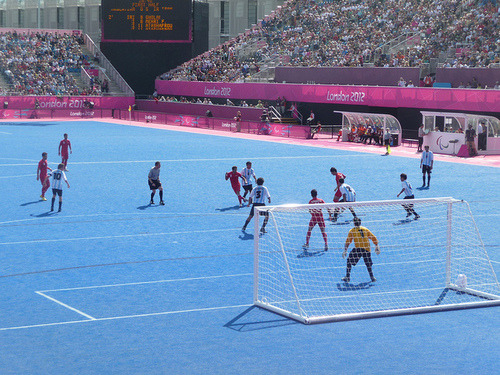
The Paralympic Games are a visceral example of how sport can contribute to the process of physical rehabilitation. However, as new studies are showing, and as many doctors and counsellors and teachers have known for years, sport can also contribute to the process of mental, emotional, social, and spiritual rehabilitation.
One book that heralds this philosophy is author and musician Dave Bidini’s mesmerizing Home and Away: In Search of Dreams at the Homeless World Cup of Soccer (published in 2010), researched as Bidini followed Homeless Team Canada to the World Cup in Melbourne, Australia, a tournament with 56 teams and over 600 players. This book is not only an engaging and precisely written documentary of sport activity, but, and more importantly, a moving narrative that will shatter readers’ preconceptions about the lives of the homeless and that could be used to promote and raise awareness about the benefits of sport to those who suffer from mental illness, addictions, post-traumatic stress, domestic and child abuse, political oppression, as well as other afflictions and personal misfortunes. I love this book and have been recommending it to everyone I know.
Mel Young and Harold Schmied—a Scotsman and an Austrian—dreamed up the Homeless World Cup while attending a conference in 2002 about street newspapers in the hopes of drawing attention to the growing numbers of homeless people around the world. Bidini’s book is also contributing to the cause as it introduces us to a whole range of characters who have found themselves homeless for a myriad of reasons, everything from addiction issues (and yes, there are a lot of addiction issues among the homeless, but the book also demonstrates how easy it is to fall into the traps of addiction and how truly difficult it is to claw your way out), to neglectful or violent parents, to divorce (not being able to afford child care payments, for instance), to bad luck in business, to the effects of the recession, to fleeing political persecution. The majority possess skills and talents, everything from managing businesses to carpentry skills to winning cheesecake-making competitions (I’m not kidding, and this was one of the male goalies). Homeless Team Canada even boasts a former Team Canada athlete. All of those involved in the World Cup of soccer have stories, and it’s the stories that make the outcome of the events truly matter.
Soccer provides routine that many are desperate for. It also provides support and friendship and a place to test and build one’s physical and mental strength. It also offers escape, release, and a temporary erasure of memory. As a once-violent player claims, “When I’m playing soccer, I’ve got fresh air coming at me. If I’m kicking a ball, I’m not hurting anyone. Playing sports, you don’t think about negative things; it’s a way of keeping those devils and demons at bay.”
One of the most compelling stories is that of teenager Krystal, who ends up being the most prolific female soccer player in the tournament. Bidini, a skilled story-teller, knows she is in fact our protagonist because she has yet to live her life and through her we can see if soccer can actually make the difference between her living the rest of her days on the street or finding herself a safe and comfortable home. For so many of these players, much has been taken from them: possessions, shelter, friends, family, even their humanity (one woman says the parade is the first time she’s been in the streets where people aren’t giving her the finger, yelling, or spitting at her). Sport gives them back a piece of themselves. For Krystal, sport gives her an identity, something she seems to have lost with the death of her mother at a young age. After successfully scoring on a penalty shot, she tells Bidini: “It’s something that no one can take from me, no matter what else happens."
I’m reminded of my dear friend Ann Peel, who was Executive Director of the charity Right to Play, and her countless stories of how boys and girls living in refugee camps were physically and spiritually transformed when sport was introduced into their daily lives. The children started to smile again, to groom themselves, to hint at the future. For me, I hope the future in this country will include equal access to sports and arts programs, two cultural activities that have been proven to keep kids in school and to tie personal identity to national identity. In other words, two activities that give us a home.
***
Priscila Uppal has been writing daily sports-inspired poems and reviewing sports art throughout the London 2012 Olympic and Paralympic Games. Don't miss her review of Tragedy on the Mountain: A Quadriplegic's Journey from Paralysis to Paralympics by Brent Poppen and the 2005 documentary, Murderball.
#priscila uppal#paralympics#paralympics 2012#paralympic games#paralympic games 2012#london 2012#london 2012 paralympics#london 2012 paralympic games#disability#rehab#physical rehabilitation#sport#sports#sports art review#sports book review#review#homeless#homelessness#homeless world cup#addiction#dave bidini#ann peel#right to play
0 notes
Text
Poem: Party Games
Girls at a slumber party
in comfy pants and tight Ts
bunched like bean bags
on the floor, giggling uncontrollably
at the antics of truth or dare.
Truth: I prefer the world from this angle.
Dare: Dance on your hands.
Truth: I believe the floor pinches me.
Dare: Reveal your bruises.
Truth: Alternating positions unnerves me.
Dare: Spike the punch.
No boys allowed,
the girls bump and grind
comparing body types
making goofy home videos
and pigging out on power.
Secrets passed
through holes in the net.
***
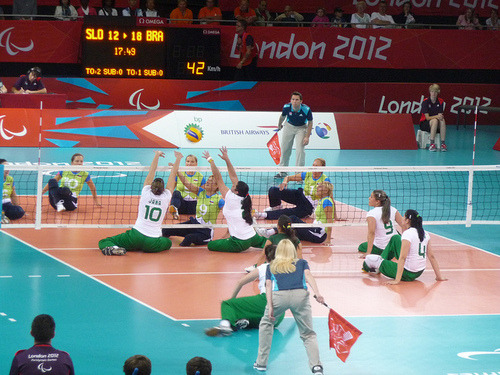
Today's London 2012 Paralympics-inspired poem was inspired by Sitting Volleyball.
Sitting Volleyball at the Excel Centre. It had never occurred to me that you could play volleyball by sliding yourself across the ground (I initially thought the athletes would be competing in wheelchairs). The game looked genuinely fun and intimate, dynamic but less aggressive than conventional volleyball. - Priscila Uppal
#london 2012#london 2012 games#london 2012 paralympic games#london 2012 paralympics#paralympic games#paralympic games 2012#paralympics#paralympics 2012#poem#poetry#priscila uppal#sitting volleyball#volleyball#slumber party#disability
1 note
·
View note
Text
Poem: Three Fates
Three lanes is this alley,
the ball chiming its intentions
to stay clear of the gutter,
find a safety net.
Like all desires,
this one too is thwarted
by treacherous traps,
obstinate obstacles,
the erection of efficient defences.
Sometimes it’s kinder
to remain in the dark
on all fours, shielded from
the ugly truths and feeling
your way in your bones of urge
to your unique failures,
your cherished prides.
For we are the sport of the gods.
Human pins toppled
in a series of strikes.
***
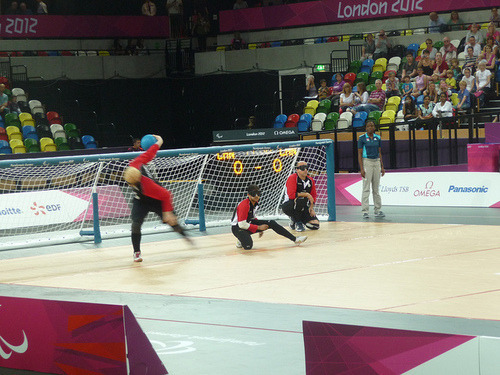
Today's Paralympics-inspired poem is about the sport of Goalball. Goalball is like handball and is played by the visually impaired. Each side has three players, each wearing shades over their eyes. They take turns trying to send a ringing ball into the net. There are three defenders to get the ball past, who are usually on the ground and, once they hear where the ball is headed, stretch their bodies out to block the shots.
#priscila uppal#london 2012#london paralympics#london paralympics 2012#london paralympic games#london paralympic games 2012#paralympics#paralympics 2012#paralympic games#paralympic games 2012#poem#poetry#goalball#goalball poetry#goalball poem#visually impaired#blind#disability
1 note
·
View note
Text
A Higher Place than the Place from which You Fell
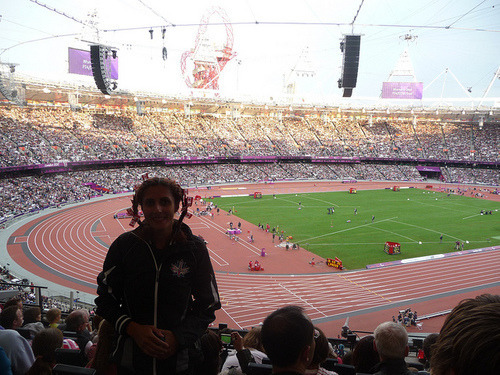
Above: Priscila Uppal at the Athletic Centre in Olympic Park, one of a sold-out 80,000-strong crowd awaiting the evening's Paralympic events.
Perhaps Brent Poppen became aware of the power of his own personal narrative after filmmakers followed his U.S. Wheelchair Rugby Team to document their activities in Murderball, because he has since added the titles “author,” “motivational speaker,” “teacher” and “rehabilitation counsellor” to the list of his athletic achievements, which includes competition in two Paralympic Games in two different sport categories (Wheelchair Rugby and Wheelchair Tennis).
Tragedy on the Mountain: A Quadriplegic’s Journey from Paralysis to Paralympics is his first book, a memoir in the inspirational athlete genre, but of course with the twist that Poppen had never imagined himself competing for his country as an athlete in a wheelchair. Athletically gifted since childhood, Poppen was simply horsing around and wrestling with a friend at a Christian camp at Lake Hume in California when a freak accident occurred and rendered him paralyzed for life. He was helicoptered to the hospital, without the love or comfort of his parents who were miles away. There, the arc of his original narrative took a violent plot turn with unexpected results, including that his popularity at school actually grew after the accident as everyone felt they knew his tragic story while Poppen himself struggled to accept his new identity.
The memoir is intended to give advice and inspiration to young people. Not just those who are living with physical challenges of the sort Poppen has experienced (although of course I think the book would make a great gift to a young person who is dealing with physical rehabilitation), but also to the general youth who might be dealing with the confusing arc of growing up and determining what kind of person you want to be in the world, what kind of values you want to cultivate, and what kind of character you want to build. While there are some detailed explications of sport and of Poppen’s gruelling training sessions in the memoir, there are also words of advice and comfort and anecdotes to illustrate how Poppen has managed to maintain his optimism, his humour, and his health under stressful conditions.
He is a born teacher, and teaches both in the school system as a substitute teacher and in his roles as motivational speaker and rehabilitation counsellor to children and young people. He is also an avid water skier and teaches this sport as well. And he will soon be breaking into new territory as a children’s author of a series called Playground Lessons. The first book is subtitled Friendship and Forgiveness and features a boy in a wheelchair playing soccer on the cover, offering positive representations of the lives of disabled children. As someone who has had a very hard time locating imaginative novels or short stories that feature disabled athletes as characters to highlight in this blog (and please do send me an email if you know of any), I’m glad to see Poppen exploring this territory, which could contribute to community building as well as to children’s literature.
All of which leads one to believe that Poppen has indeed ended up at a higher place than the place from which he fell, one of his personal mottos. Although a blood infection knocked Poppen’s health off track again and has caused him to miss competing in the London Paralympic Games, he is still hopeful that he might compete in Rio in 2016. And even if that dream doesn’t materialize, I’m sure he’ll be imagining new ways to make his mark in the world, particularly on young people, through his example and his words.
***
Don't miss Priscila Uppal's review of the documentary, Murderball, or her poem "Three Views of a Ramp," inspired by wheelchair athletes.
#priscila uppal#brent poppen#wheelchair rugby#wheelchair tennis#counsellor#murderball#london 2012#london 2012 paralympics#london 2012 paralympic games#paralympics#paralympics 2012#paralympic games#paralympic games 2012#tragedy on the mountain#quadriplegic#paralysis#memoir#review#sports art review#sports book review#inspirational athlete#athlete#athletic#playground lessons#disability#disability books
1 note
·
View note
Text
Poem: World Record Jukebox
You don’t need to check
listings for your number.
Swagger up to the jukebox
and watch the needle drop.
Your movements imprinted
on those dark grooves.
Step back and slowly,
Slowly tap your toes
as the dance floor fills.
Your record spins now
on its own momentum.
This is the tune you’ll be
humming in elevators
for the rest of your life.
***
For another world record-inspired poem by Priscila Uppal, check out "Blade Runner," or browse through her poems inspired by the London 2012 Paralympics and Olympic Games.
#priscila uppal#world record#poem#poetry#paralympics poem#paralympics poetry#paralympics world record#poet#london 2012#london 2012 paralympics#london 2012 paralympic games#paralympics 2012#paralympics#paralympic games#paralympic games 2012#jukebox#elevator
0 notes
Text
Poem: Blade Runner
For Oscar Pistorius
My mother’s favourite film—
over 100 screenings in the theatre over three decades
and she’s not embarrassed in the slightest
because she’s not the only one
who upholds its spot in the epitome of sci-fi.
And I grew up in my father’s lap
adjusting the TV antenna
and my fascination with modern science
as we followed the adventures of the Million Dollar Man.
While my nephew parkours about
the basement in Iron Man T-shirts
and Optimus Prime masks.
You are our future fantasies
bolting into the present, caught in HD
on our video screens, proving
the human-replicant debate
sorely outdated.
All that matters in the end
is the planet is dying
and we require imagination implants
to search for new conceptions
of home.
***
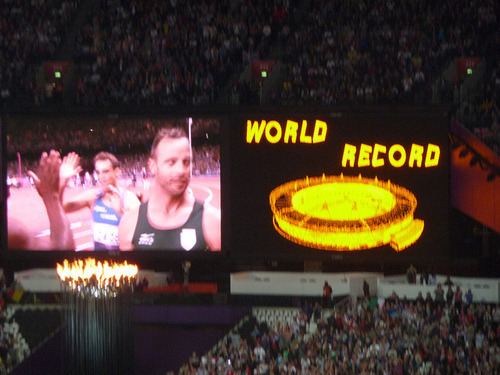
I had the historic pleasure of watching Oscar Pistorius smash the world record in the 200m in the third heat of the qualifications rounds: 20.30 in front of a crowd of 80,000 yesterday at Olympic Park. - Priscila Uppal
#blade runner#priscila uppal#oscar pistorius#200m#olympic park#sci fi#million dollar man#iron man#optimus prime#world record#paralympics#paralympic games#paralympics 2012#paralympic games 2012#poem#poetry#paralympics poem#paralympics poetry#disability#running#racing#london 2012#london games 2012#london paralympics 2012#london paralympics
2 notes
·
View notes
Text
Poem: Medley
The first takes us back to edge of the world.
The second to when we were tadpoles in the pool of time.
The third turns crystals into chrysalides.
All so the fourth can set each one free.
Eradicating race.
***
"Medley" is the third in a series of daily poems by Priscila Uppal as an LRC correspondent and Can Fund poet-in-residence at the London 2012 Paralympic Games. "The Power of Suggestion" was inspired by cycling; "Three Views of a Ramp" is a wheelchair-shaped poem inspired by sports, ramps, podiums.
#priscila uppal#poem#poetry#sports poem#sports poetry#paralympics poem#paralympics poetry#paralympics#paralympic games#london 2012#london 2012 games#london 2012 paralympics#paralympics 2012#paralympic games 2012
0 notes
Text
Wheelchair Warriors: Murderball
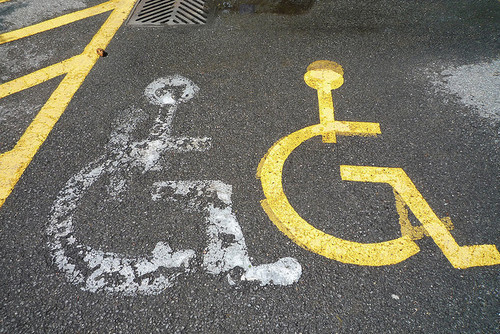
Photo by Tim and Selena Middleton
The majority of the people here at Olympic Park have never seen Paralympic sport before. While it is just as exciting as other more conventional and recognizable sport competitions, Paralympic sport does sometimes require explanation for the uninitiated. At the venues, before events, videos inform audiences about the various disability categories and rules of the games and races, which leads to more knowledgeable and engaged spectators, which can then lead to enthusiastic long-term fans.
One of the ways many people in North America first became aware of Paralympic sport was when the documentary Murderball (2005; directed by Henry Alex Rubin and Dana Adam Shapiro) was nominated for an Academy Award. For those who haven’t seen it, although it follows the path of Team U.S.A. Wheelchair Rubgy on its way to the Paralympic Games in Athens, Greece, there is also a great deal of focus on Team Canada’s Wheelchair Rugby Team as well, since Canada emerges as a significant rival after the larger-than-life Paralympic legend Joe Soares, in a fit of rage at being cut from the U.S. team due to the decline in his abilities that naturally occurs with age, decides to coach the Canadians. Labelled a traitor to his country by the American athletes, Joe Soares lives, breathes, sleeps, yells, spits, punches Wheelchair Rugby (or, as it is sometimes called, Murderball, which was invented in 1977 by Canadians by the way—the first international tournament took place in Toronto in 1989) to the extent that he is oblivious to his own insensitivity to his long-suffering wife when they go out to dinner to celebrate their wedding anniversary and he toasts Team Canada instead of her. (He apparently asked the directors to cut this scene, which they refused to do, as it revealed so much of Joe’s character and his obsession with the sport.)
And what a character he is. As are many of the other young men one meets throughout the documentary through the lens of full-contact rugby, played in custom-made manual wheelchairs, which look like metal war vehicles, on a basketball court. This is not a sport for the faint of heart. It’s fast-paced and ruthless as the teams crash into each other, frequently toppling those inside of the wheelchairs, as they attempt to carry a ball over a line. It’s also mentally challenging, as these athletes trash talk each other incessantly (as does Joe from the sidelines) and are not above personal jabs. Bruises on the outside and the inside are part of the game.
Off the court, one discovers the same range of personalities you might find in any group of young men, including a cocky one, a sensitive one, a funny one, and even a playboy. You also learn some surprising things about the private and personal lives of these disabled young men. According to one young man, picking up women in a wheelchair isn’t that difficult. Apparently, they are comforted by the non-threatening exterior, which allows for more meaningful conversation to flow more naturally from the beginning. Once they are assured of the fact that sexual activity is still possible, they welcome the experimentation the novel circumstances involve.
But the most surprising claim, and one which I have heard already this week by several Paralympic athletes, is given the opportunity to have one’s able body back, many would outright refuse. The disability took their lives in new but also valuable directions. Being on a Paralympic Wheelchair Rubgy Team has introduced them to new friends, it has allowed them to travel and see the world, to represent their country, and to be a role model in their communities. Who knows if they would have so many strong friendships and unique experiences if illness or accident hadn’t interfered in what they thought was the course of their lives. This is important to keep in mind, I think, while we watch Paralympic sports, because it makes us question any feelings of pity we might harbour for the challenges of the athletes. They don’t want our pity. They want our applause.
I have tickets to Wheelchair Rugby on September 5th. The documentary has prepared me, in part, for what I’m about to see. (And perhaps I will actually see one or two of these same athletes compete for Team U.S.A or Team Canada.) It has also made me appreciate how cruel turns of fate can sometimes lead you to interesting places. If not for my own experience of disability through my father, I’m not sure I would have proposed this project or written many of these poems.
***
Don't miss "Three Views of a Ramp," a poem written by Priscila Uppal inspired by wheelchairs, sports, and podiums.
#priscila uppal#olympic park#paralympics#paralympic games#paralympics 2012#paralympic games 2012#london 2012#london paralympics#london paralympics 2012#london games#london games 2012#london paralympic games#london paralympic games 2012#athletes#sports#paralympic athletes#paralympic sports#disability#murderball#wheelchair rugby#joe soares#rugby#paralympics rugby#pity#wheelchair#review#film review#documentary review
4 notes
·
View notes
Text
Poem: The Power of Suggestion
I take my seat before the scientists appear
with strange wires and clipboards and a smelly jelly
they smear without notice onto my forehead and chest.
I thought I had purchased a ticket for indoor track cycling,
but apparently I made a wrong turn in Olympic Park—
a rarity since the English love signage almost as much
as they love sugar and the Queen—and my will
was revoked along with my flash camera and water bottles.
The screens roll incessantly with data. It takes me an entire round
of heats to realize the zigzags and geometric symbols
publicize my mental and bodily states
while the countdown to my hypnotism unfolds
and the athletes lap my queries before I have
a chance to ask them.
Two hours later I find myself feeling more refreshed
than I can remember in a long time. My blood pressure plummets.
Emotions on even keel. My memory for my childhood
has vastly improved although I can’t remember who won what
and how to ride a common bicycle.
What I do remember is listening to the soothing voice of wheels
turning in unison and the ticking and swaying of a giant clock.
What I take home with me besides a torn ticket stub,
is the suggestive power of ellipticals
to pull us into orbit or to let us abandon
the physics of here and drift off with the shooting stars.
***
Today's Paralympics-inspired poem by Priscila Uppal is meant to capture the hypnotic feeling of watching cycling at the Velodrome. Don't miss "Three Views of a Ramp," or her thoughts on why the Paralympics are not just another sporting event, but "an opportunity to change and challenge bodies, minds, perspectives, fields of research, and communities."
#paralympics#paralympics 2012#london 2012#london 2012 paralympics#london games#london games 2012#paralympic games#paralympic games 2012#priscila uppal#poem#poetry#paralympics poem#disability#cycling#velodrome#track cycling#hypnotic#bicycle#sports poetry#sports poem#cycling poem
0 notes